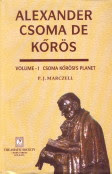 |
Tomb of Alexander Csoma De Koros, Darjeeling
blogger.com |
 |
| Map of Darjeeling, West Bengal. darjeeling-tourism.com |
their luck in their profession, passion and skill. Since Calcutta happened to be the main center of trade, innumerable European families settled there, either working for the English company
or for the private companies. Some were on their own, takingcare of their livelihood and pursuing their interest. India, being a hot country with horrible summer, the discovery of hill station Darjeeling was a blessing indisguise and mostof the European families would make a beeline to that hill resort to cool off during summer days on the plains. Obviously this place, famous for Darjeeling tea, was visited by well known personalities. Alexander Csoma De Koros was one among them, but, for a different reason. He came to this beautiful hill resort to take an eternal rest in the shadow of the holy ghost.
 |
| Alexander Csoma Bust Asiatic Society of Bengal, wikipedia |
Sándor Csoma; 27 March 1784/8 - 11 April 1842) was born in Kőrös, in Transylvania (today part of Covasna, Romania). His birth date is often given as 4 April, which is actually his baptism day and the year of his birth is controversial; some authors put it at 1787 or 1788 rather than 1784. Hailing from a poor family, the sixth child of András Csoma and his wife, Krisztina Getse (Ilona Göcz). His name in English is written as Alexander Csoma of Koros and in Hungarian Kőrösi Csoma Sándor (Kőrösi means "of Koros). Between 1816 and 1818 he studied Oriental languages; he was Göttingen where he had a name for his proficiency in 13 languages including Latin, Greek, Hebrew, French, German, and Romanian apart from his native Hungarian. When in Calcutta he also mastered Bengali, Marathi and Sanskrit. A scholar in Buddhist philosophy and Tibetan languages, on his 200th birth anniversary in 1984, the Hungarian government released a postal stamp depicting him and his travel. A park in his memory was opened in 1992 at Tar by none other than the Dalai Lama, a great spiritual leader.
 |
| postal stamp iin honor of Csoma. balkhandshambhala.blogspot.com |
We have not heard much about Alexander Csoma De Koros and his activities in India as we have about other Britishers because of lack of publicity or ignorance. De Koros, a Hungarian Linguist, philologist, traveller and Orientalist, was from Koros, Hungary (D.B.O: 4th April 1784). Being an avid traveller, his favorite destination was Asia. In 1820s after settling down here, he took keen interest in the Tibetan language and Buddhist philosophy. His obsession with the language and religion made him spend much of his time in a productive way. He was a polyglot, knowing 17 languages. Having gained proficiency in the Tibetan language, he produced the first Tibetan-English dictionary and grammar book. His keen interest in the local language and religion left a deep impression on the natives who called him Phyi-glin-gi-grwa-pa in Tibetan, meaning “the foreign pupil” and was given the title of Bosatsu or Boddhisatva (Buddhist sainthood) by the Japanese on 22 February 1933 in Japan. Indeed, a great honor and achievement for a foreigner.
 |
Tomb of Alexander Csoma De Koros, Darjeeling
blogger.com |
 |
| Statue of Alexander Csoma de Koros riding a yak |
An interesting fact emerges from his biography. De Koros arrived Lahore (now in Pakistan) all the way from his country on foot, covering a vast distance and different terrains all alone, taking considerable risk to his life. Then he moved on to the monastery of Zangla village in Ladakh via Kashmir, India. Astonishingly, he covered a long, strenuous journey on a rugged terrain - in total 12000 km from Hungary. It shows his sheer guts and determination to pursue his passion. It was his pioneering works in the Tibetan languages despite his tough days in a strange place that attracted the western scholars to take interest in this language. At Zangla, he learned Buddhist philosophy under a Lama and also learned the langauges spoken there. Later he moved over to calcutta to publish his works.
That we are being dictated by the edit of god is true in the case of De Koros. He was on his way to Lhasa, Tibet and unfortunately, he could not move far beyond Darjeeling where he contracted Malaria, a dreadful disease in those days. Medication did not work and De Koros died on 12 April 1942 from fever in Darjeeling. He was just 58 years of age.
Located within the Old Christian Cemetery, a mile from the Darjeeling town, a small hexagonal memorial tomb on a low platform is built over the grave of noted Hungarian Philologist Alexander Csoma de Koros who died at Darjeeling in 1842 AD. The tomb is on Lebong Cart Road which overlooks the Darjeeling town and the tea estates. The Asiatic Society of Bengal, to honor him, erected the monument over his grave, the Hungarian memorial tablet was placed over it. A tablet was placed by the Hungarian government with the words of Count Istvan Szechenyi : "A poor lonely Hungarian, without applause or money but inspired with enthusiasm sought the Hungarian native country but in the end broke down under the burden"
https://1001things.org/tomb-alexander-csoma-de-koros-darjeeling/
https://en.wikipedia.org/wiki/S%C3%A1ndor_K%C5%91r%C3%B6si_Csoma
 |
| Plaque. tomb of Csoma de Kőrös , Darjeeling 1001things.org |
 |
| vedamsbooks.com |
https://en.wikipedia.org/wiki/S%C3%A1ndor_K%C5%91r%C3%B6si_Csoma









